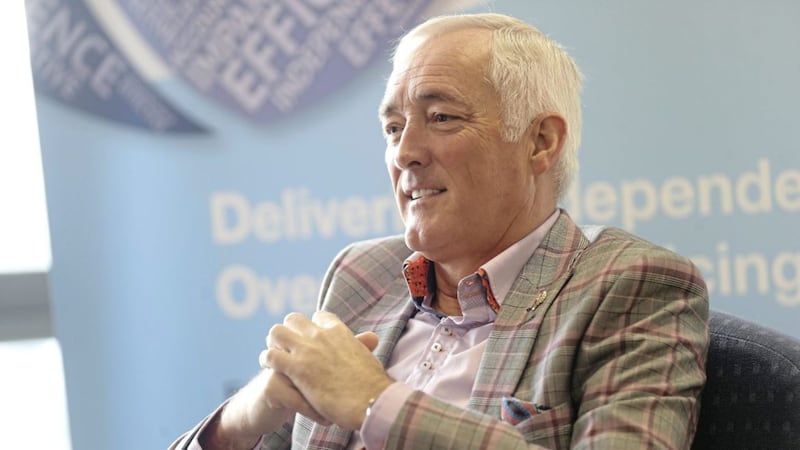Chairman of the Policing Board Doug Garrett has said embattled chief constable Simon Byrne has “things to learn”.
Mr Byrne has faced intense criticism over his handling of several controversies since his appointment in July 2019.
The publication of the South Armagh Policing Review last month was the latest in a long list of public relations mishaps for the former chief constable of Cheshire Constabulary.
He was later forced to roll back on some recommendations arising from the report after a unionist backlash.
The sensitive review was triggered after Mr Byrne tweeted a picture of himself and several heavily armed PSNI officers standing outside Crossmaglen police station on Christmas Day 2019.
He later apologised and announced a review in the south Armagh area.
Last year unionist leaders called for his resignation over the PSNI's handling of the funeral of senior republican Bobby Storey in west Belfast.
He was also criticised after members of the public attending Black Lives Matter protests were issued with fines.
Asked how he would appraise the past year for Mr Byrne the Policing Board chair said it was one of “ups and downs”.
“He threw himself into the job, got out there, got around, saw lots of people and was seen on the ground all over the place," he said.
“Some of that was good and as you known some of the photos less good.
“There are certainly things to be learned from but it’s nothing to do with his aptitude and desire to get out there and make a difference.
“That he has definitely done well.”
Mr Garrett said he has been impressed by Mr Byrne’s ability to accept when things don’t go as planned.
“The biggest strength for me is that he is prepared to listen, prepared to reflect on his view and prepared to accept when he gets it wrong as well,” he said.
“I think too often in the past we have had chief constables who, the feeling is the chief constable has to be tough, strong, stand up, do their own thing and that’s it - whatever the cost.
“To my mind any sensible chief constable should be reflecting at all times on what happens, reviewing that and changing where they need to change, holding firm where they need to hold firm but it’s not a case of you are never wrong, none of us are never wrong, even journalists, I know that’s hard to believe.”
The board chair believes there are areas where Mr Byrne can improve his knowledge.
“I wouldn’t say he has fallen short, he has things to learn,” he said.
“It’s difficult coming in, understanding of politics, our island, the geo-politics, north-south, between east and west, all of that as we know has thrown up issues - he is new to that.
“He is to some extent refreshing because he is not engrained or seen to be from side of the community or another, which as we know here is always an issue.
“That’s a good thing but it does mean that perhaps some of the nuances that go on and the understanding around sensitivities and other things have not been there and have to be learned.”
Mr Garrett believes the coronavirus crisis may also have had an adverse impact.
“And maybe part of the Covid thing has made it difficult for those lessons and those ideas to be picked up on as quickly as they could or should be,” he said.
The recent south Armagh review made 50 recommendations, some of which sparked unionist criticism.
Mr Garrett believes mistakes were made in how the content of the report was made public.
“Having heard it in presentation and the detail around it and some of the potential, it wasn’t difficult to work out where the red lights would be in certain communities and the unfortunate bit was that was allowed to run,” he said.
“There was a rhetoric out there that had an assumption that everything in there (the report) was a fait accompli when it wasn’t and that I think was the biggest problem.
“It should have been clear what was acceptable and what was likely to be accepted and what wasn’t.
“And indeed that’s the position the board has taken.”
He explained that the oversight body has now asked for “specifics around which of the 50 findings are going to be carried forward, which aren’t”.
The PSNI has also been accused of two-tier policing arising out of the Bobby Storey funeral - a charge flatly rejected by Mr Garrett.
“I don't believe that there's two tier policing but that's not to say that there isn't more that could be done to actually ensure that people believe they are being listened to,” he said.
“But it needs to be done in a balanced way.
“I have heard their arguments and I understand what they are saying but I don't agree with the conclusions that there are two-tier policing.”
Mr Garrett said that if bias was detected it would be raised with police chiefs.
“We are here to hold to account and that’s one of the things we hold to account for, if we believed that there were two-tiered policing that would be something that would have to be taken up with the chief constable,” he said.
“Policing is done in a way that is not two-tier.”
Since the PSNI was established two decades ago a major focus has been to attract more Catholic recruits to its ranks.
Latest figures reveal that fewer Catholics, 30 per cent, applied to join the PSNI during its latest recruitment drive.
Over 65 per cent of applicants were from a Protestant background.
The number of serving Catholic officers remains at around 32 per cent.
The chairman concedes that more needs to be done to encourage Catholics to join the force.
“We do want to see that addressed absolutely,” he said.
However, despite the sluggish returns Mr Garrett reveals that the Policing Board has not discussed the possibility of a return to 50-50 recruitment, which ended in 2011, in recent times.
On why many Catholics are reluctant to join he said “the issue is not just about the PSNI, it’s about society and society perhaps has not changed in so much as we would have hoped it would in those 20 years.
“If you live in an area where's there's a resistance and even a danger in being as part of the police force then that makes (it) much more hard to join because you may have to move away from your family, friends, whatever,” he said.
He believes the reluctance of many Catholics to choose policing as a career is not just down to any threat that may come from dissident republicans.
“It’s not just the threat, it’s the perception of the role in terms of your family, your community, your neighbourhood,” he said.
“There may well be in certain areas threats as well but it’s that impact that I think makes it harder sometimes for people from particular communities to step forward.”
He rejects any suggestion that policing has not changed sufficiently in the past two decades.
“I don't believe that they haven’t, no, the premise that they haven’t moved far enough or that they are not open or accepting, I don't accept,” he said.
“That some people believe it to be the case, yes, I can understand where that idea can come from.”
Catholics are also under represented in the senior ranks.
Mr Garrett believes there “are some positive signs in… the middle order that will drive different change but the fundamental bit is actually getting the applicants coming through and into the system and that's not right, it's not at the level it should be.
“I won’t attempt to defend that, it’s not right, we need to see a change and it’s not helped by all that goes on in terms of the noise in the system from the past,” he said.
He believes that “if we don’t get more from a nationalist, republican, Catholic background going in there we will not have the PSNI that is seen to be representative and we will not be able to deliver what we all want, which is a police force for the entire community”.
A Co Antrim native, Mr Garrett was elected to the post of chair last year after joining the board as an independent member in 2018.
He was previously well known in business circles and acted as Operations Director and Deputy Chief Executive Officer at Belfast’s Laganside Corporation.
More recently he also held the position of CEO at Blackpool Regeneration Company in England.
He revealed that he had no aspirations to take on the role of board chair, has no political links and has no "personal agenda".
He said policing in a divided community presents its own difficulties.
“I hate being put in boxes and I really wish we were just talking about community as all of us,” he said.
“This divided society is really tough and delivering policing in that is really difficult.”
He reiterates his belief that despite the difficulties faced by the PSNI in recent months Simon Byrne has a role to play.
“I do genuinely think there are strides being made, and positivity, and going back to the starting point, we have a chief constable who is not in any of those boxes, he genuinely isn’t.
“He is somebody who wants to deliver good policing and that’s not to say mistakes haven’t been made but he wants to deliver good policing.”
“The more we can do to support that (the better), otherwise we are never going to be able to progress.”
He believes society needs “good policing to respect the rule of law” adding that can be difficult.
“It’s a great shame, we need to move beyond this divided society,” he said.
“I’m not going to fix it, I realise that.
“I can but hope that as we move down the road to whatever conclusions that road takes us to, that we find a position where we can all be one and happy to be one.”


